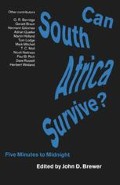Abstract
Southern Africa is a region in which for long the United States had only very limited interests and in which the Soviet Union had virtually none at all. Britain had been without doubt the paramount external power in the area, with only minor competition from France and Portugal. However, by the mid 1970s British influence had declined considerably, and Portuguese colonial rule in Angola and Mozambique had disintegrated. Against this background, opportunities for Soviet intervention were provided by the civil wars in Rhodesia, Namibia and, above all, in Angola; and the United States was drawn in to stiffen the Western position, albeit hampered by the post-Vietnam anxieties of Congress and the diplomatic drawbacks of being too openly on the same side as the South Africans.
I am grateful for the comments on this chapter of Jack Spence, Jorn Day, Gareth Winrow and the members of the South Africa Workshop of the European Consortium for Political Research, Amsterdam, April 1987. A different version appears in R. Allison and P. Williams (eds), Superpower Competition and Crisis Avoidance in the Third World, Cambridge, Cambridge University Press, forthcoming.
Access this chapter
Tax calculation will be finalised at checkout
Purchases are for personal use only
Preview
Unable to display preview. Download preview PDF.
Notes
R. W. Johnson, How Long Will South Africa Survive? London, Macmillan, 1977, p. 173.
Peter Clement, ‘Moscow and Southern Africa’, Problems of Communism 34, March–April 1985, p. 45.
G. R. Berridge, The Politics of the South Africa Run: European Shipping and Pretoria, Oxford, The Clarendon Press, 1987, pp. 194–7.
Larry Bowman, ‘The Strategic Importance of South Africa to the United States: An Appraisal and Policy Analysis’, in D. Aluko and T. M. Shaw (eds), Southern Africa in the 1980s London, Allen & Unwin, 1985, pp. 139–40; and
K. Booth, Navies and Foreign Policy, London, Croom Helm, 1977, p. 173.
For example, Clement, ‘Moscow and Southern Africa’, p. 30; R. Legvold, ‘The Soviet Threat to Southern Africa’, in R. I. Rotberg and others, South Africa and Its Neighbours: Regional Security and Self-Interest, Lexington, Mass., Lexington Books, 1985, pp. 27–30;
David E. Albright, ‘Moscow’sAfrican Policy of the 1970s’, in David E. Albright (ed.), Africa and International Communism London, Macmillan, 1980, p. 49; and
Kurt M. Campbell, Soviet Policy Towards South Africa, London, Macmillan, 1986, p. 165.
W. J. Foltz, ‘United States Policy toward South Africa: Is One Possible?’ in G. J. Bender, J. S. Coleman and R. S. Sklar (eds), African Crisis Areas and U.S. Foreign Policy, Berkeley, University of California Press, 1985, pp. 38–42.
William J. Foltz, ‘United States Policy Toward Southern Africa: Economic and Strategic Constraints’, Political Science Quarterly 92, 1, Spring 1977, pp. 56–8; and
Dieter Braun, The Indian Ocean: Region of Conflict or ‘Peace Zone’ translated from the German by C. Geldart and K. Llanwarne, London, Hurst, 1983, p. 44; cf. Campbell, Soviet Policy Towards South Africa p. 150.
Foltz, ‘United States Policy toward South Africa: Is One Possible?’, p. 35; and J. T. Richelson and D. Ball, The Ties That Bind, London, Allen & Unwin, 1986.
Arthur J. Klinghoffer, ‘The Soviet Union and Superpower Rivalry in Africa’, in B. E. Ardinghaus (ed.), African Security Issues Boulder, Colorado, Westview, 1984, p. 30. Insofar as Soviet bloc concurrence in the presence of Western multinationals in southern Africa, as opposed to acceptance of Western aid for the region is concerned, this is more readily forthcoming from certain East European countries than from Moscow itself; see Coker, Nato, the Warsaw Pact and Africa pp. 187 and 202.
Anthony Sampson, Black & Gold: Tycoons, Revolutionaries and Apartheid, London, Hodder & Stoughton, 1987, pp. 101–2.
Robert S. Jaster, ‘South Africa and its Neighbours: the Dynamics of Regional Conflict’, Adelphi Paper 209, Summer 1986, p. 66;
and Lt-Gen. D. J. Earp (Chief of the SA Air Force), ‘The Role of Air Power in Southern Africa’, in M. Hough and M. van der Merwe (eds), Contemporary Air Strategy, Ad hoc Publication No. 23, Institute for Strategic Studies, University of Pretoria, April 1986, pp. 27–52.
W. J. Foltz, ‘Africa in Great-Power Strategy’, in W. J. Foltz and H. S. Brewer (eds), Arms and the Africans, New Haven, Yale University Press, 1985, pp. 15–16.
J. E. Spence, ‘Soviet Relations with Africa’, Soviet Jewish Affairs, 15, 1, 1985, p. 126.
Its treaty with Angola has no defence provisions at all; see Against Racism, Apartheid and Colonialism: Documents published by the GDR 1977–1982 Dresden, Verlag Zeit im Bild, 1983, pp. 244–6 and 265–6 (Treaty with Mozambique). However, supplementary military agreements appear to have been negotiated by the GDR with both Angola and Mozambique, though their terms remain secret.
Conor Cruise O’Brien, ‘What Can Become Of South Africa?’, Atlantic Monthly, March 1986.
G. Volsky, ‘Cuba’, in T. H. Henriksen (ed.), Communist Powers and Sub-Saharan Africa, Stanford, California, Hoover Institution Press, Stanford University, 1981, p. 68.
A. L. George, ‘Missed Opportunities for Crisis Prevention: The War of Attrition and Angola’, in A. L. George (ed.), Managing US-Soviet Rivalry: Problems of Crisis Prevention, Boulder, Colorado, Westview, 1983, pp. 211–19.
R. E. Bissell, South Africa and the United States: The Erosion of an Influence Relationship, New York, Praeger, 1982, p. 31.
On South African attitudes to the UN, see John Barratt, ‘South African Diplomacy at the UN’, in G. R. Berridge and A. Jennings (eds), Diplomacy at the UN, London, Macmillan, 1985
See Anthony Verrier, International Peacekeeping: United Nations Forces in a Troubled World, Harmondsworth, Penguin Books, 1981, Chapter 8.
Editor information
Editors and Affiliations
Copyright information
© 1989 John D. Brewer
About this chapter
Cite this chapter
Berridge, G.R. (1989). The Role of the Superpowers. In: Brewer, J.D. (eds) Can South Africa Survive?. Palgrave Macmillan, London. https://doi.org/10.1007/978-1-349-19661-6_2
Download citation
DOI: https://doi.org/10.1007/978-1-349-19661-6_2
Publisher Name: Palgrave Macmillan, London
Print ISBN: 978-0-333-47060-2
Online ISBN: 978-1-349-19661-6
eBook Packages: Palgrave Political & Intern. Studies CollectionPolitical Science and International Studies (R0)

